4 Benefits of Black Garlic
Not as Strong an Odor as Regular Garlic
Medically reviewed by Aviv Joshua, MS
Black garlic is aged raw garlic that turns black due to what's called the Maillard reaction. This is a chemical process between amino acids and reducing sugars. Regular, white garlic turns brownish-black under humid temperatures for an extended period.
The aging process changes the color, texture, taste, and smell, making the garlic less aromatic, sweeter in flavor, and softer/stickier in texture. Aging can also impact the bioactive compounds in garlic, reducing allicin content and increasing other compounds, such as phenol and organosulfur.
This article discusses black garlic's flavor, texture, and smell, potential health benefits, and who should avoid it.

Gu Min / Getty Images
Benefits of Black Garlic
The health benefits of regular garlic are plentiful and supported by research. However, research investigating black garlic's benefits for humans is ongoing, and more extensive studies are needed. Many studies evaluate using aged garlic extract, not edible black garlic.
Scavenges Free Radicals
Garlic contains more than 20 well-known polyphenolic compounds, a source of antioxidants. Black garlic is thought to have higher concentrations of antioxidants than white garlic.
Antioxidants scavenge free radicals, atoms containing one molecule with the potential to cause cellular damage. Diets rich in antioxidants are associated with longevity and reduced risk of certain diseases.
Supports a Healthy Heart
Studies show taking garlic supplements can reduce low-density lipoprotein (LDL) cholesterol and blood pressure.
In one study, participants with congestive heart failure were given supplements containing 20 grams of concentrated black garlic for six months. After taking the supplements, researchers found better outcomes, including improved circulation and increased distance in the six-minute walking test.
Another small study found that participants with high cholesterol who consumed 12 grams of black garlic daily (four cloves) for 12 weeks showed some improvements in endothelial (the inner lining of blood vessels) function, but there was no change in cholesterol.
Benefits the Gut
Black garlic contains large concentrations of melanoidins, a prebiotic that resists digestion in the upper gut and reaches the large intestine. This is where the melanoidins break down nutrients. Prebiotics are important for bowel regularity and nutrient absorption.
Keeps the Brain Healthy
The literature on black garlic and brain health is centered around animal studies, so more research is needed to determine its impact on human health. However, researchers suggest that black garlic may impact the brain due to its antioxidant properties and can play a role in reducing oxidative stress (unstable molecules called free radicals), which causes inflammation. Black garlic may help improve memory and reduce cerebral plaques.
Other Potential Benefits
Although more research is needed, other potential benefits of black garlic include:
Suppresses the allergic response
Has anticancer properties
Protects against diabetes
Supports liver health
Black Garlic vs. White Garlic
Black garlic and white garlic (fresh garlic) are both nutritious. Fresh garlic is rich in allicin, a sulfur-containing natural compound responsible for the pungent smell and spicy bite. Allicin has been linked to various health benefits, including heart health, cancer prevention, and immune function.
Aging garlic (black garlic) reduces its allicin content while increasing other important plant-based compounds like organosulfur, p-coumaric acid, caffeic acid, and gallic acid. For those who shy away from garlic due to its odor, black garlic is a great alternative. Nutritionally, the macronutrients are fairly similar, with black garlic having slightly more calories and carbohydrates.
Taste and Texture
Black garlic is softer and more delicate than white garlic bulbs. Black garlic tastes comparable to balsamic vinegar with a hint of roasted garlic. The curing process, which ages the garlic, changes the amino acids and sugars, concentrating the sugar.
The firm, white, and juicy cloves turn brownish-black and are stickier and sweeter. Black garlic consistency is similar to dried fruit, such as dates.
In cooking, black and white garlic are versatile ingredients, adding flavor and nutrients to dishes. Chefs use black garlic as a sandwich spread, in pan sauces, hummus, salad dressings, pasta dishes, roasted vegetables, meat dishes, and more.
Reasons to Avoid Black Garlic
Most people can eat garlic regularly without issues. If you are allergic to garlic in general, you should also avoid black garlic. You also may need to be cautious with your intake if you experience heartburn or stomach upset after consuming garlic.
Taking garlic supplements may increase the risk of bleeding due to its antiplatelet effects. Speak with a healthcare provider before trying garlic supplements, especially if you take an anticoagulant (like Jantoven, a brand of warfarin) or need surgery. In addition, garlic may interfere with other medications.
Summary
Black garlic (aged garlic) is a versatile and nutritious ingredient. With reduced levels of allicin, black garlic is less pungent and tastes sweeter than its white counterpart. The aging process may also increase its antioxidant power, making it a healthy ingredient.
Although human clinical trials on black garlic are lacking, the health benefits are likely comparable to those of regular garlic. These health benefits include supporting heart, gut, and brain health and lowering the risk of certain diseases. Speak with a healthcare provider before trying garlic supplements, as they may interfere with certain medications.
Read the original article on Verywell Health.
